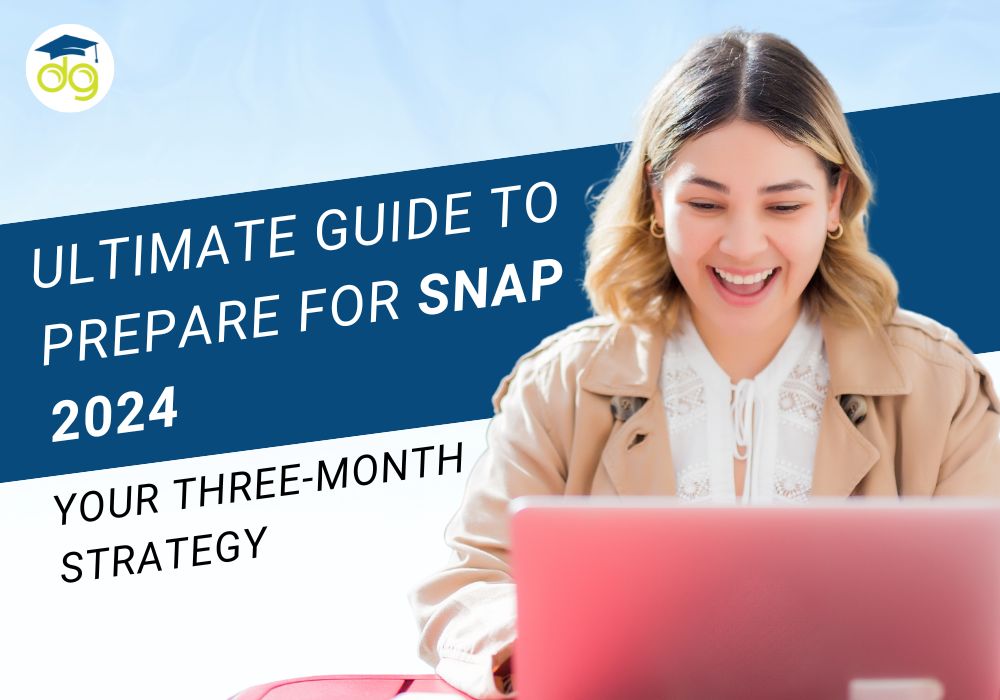Ultimate Guide to Prepare for SNAP 2025: A Three-Month Success Plan
Achieve SNAP 2025 Success with This Three-Month Preparation Blueprint
SNAP is an integrated admission process for students expecting to graduate from Symbiosis International University and its sister institutions seeking a postgraduate program. Given that November 22 will be the last date for application, and the exam dates have been scheduled on December 8, 15, and 22, this three-month aggressive plan will guide you through how to prepare best for a competitive score.
Overview of SNAP
SNAP is a competitive entrance exam targeted at testing students based on a number of academic and analytical skills that will enable a candidate to shine in postgraduate business studies. The exam tests the candidate's ability to solve problems, which can be very challenging in management environments.
Exam Pattern
The SNAP exam consists of multiple-choice questions divided into three main sections:
General English: This tests your prowess in the English language, featuring:
Reading Comprehension: Assessing your ability to read and interpret passages.
Verbal Ability: Covering grammar, vocabulary, and sentence correction.
Synonyms and Antonyms: Testing your knowledge of word meanings and usage.
Para Jumbles: Challenging you to unscramble jumbled sentences into coherent paragraphs.
Fill in the Blanks: Requiring you to choose the right words to complete sentences.
Analytical and Logical Reasoning: This section evaluates your reasoning and problem-solving skills through:
Critical Reasoning: Analyzing arguments, assumptions, and conclusions.
Syllogisms: Applying logic to relationships between statements.
Data Sufficiency: Determining whether provided information is adequate to answer a question.
Puzzles: Solving logical sequences.
Series: Observing patterns in sequences of numbers or letters.
Quantitative Aptitude: This part focuses on mathematical skills and essential concepts, including:
Arithmetic: Percentages, ratios, and basic financial mathematics.
Algebra: Basic equations, inequalities, and functions.
Geometry: Properties of shapes and basic theorems.
Number System: Understanding integers, rational numbers, and number properties.
Data Interpretation: Analyzing data from graphs, tables, and charts.
Statistics: Mean, median, mode, and basic probability.
Familiarizing yourself with these areas will enhance your study sessions and ensure thorough preparation.
SNAP 2024 Syllabus
To prepare well, it's crucial to know the detailed syllabus of each section of SNAP. Here’s what you need to work on:
1. General English
Reading Comprehension: Practice reading different texts to enhance your comprehension skills, focusing on main ideas, tone, and supporting details.
Verbal Ability: Engage in exercises covering various grammatical constructs, verb forms, punctuation, and sentence constructions.
Synonyms and Antonyms: Build your vocabulary using flashcards or mobile apps.
Para Jumbles: Practice rearranging sentences to improve your logical connections between ideas.
Fill in the Blanks: Develop strategies to identify context clues and word associations.
2. Analytical and Logical Reasoning
Critical Reasoning: Read and analyze sample arguments; identify premises, conclusions, and assumptions. Use practice exercises to strengthen or weaken arguments.
Syllogisms: Study common syllogistic forms and learn to diagram arguments.
Data Sufficiency: Work on sample questions to assess whether provided information is adequate.
Puzzles: Solve various logical puzzles to enhance your reasoning ability.
Series: Regularly practice identifying numerical and alphabetical series to improve speed and accuracy.
3. Quantitative Aptitude
Arithmetic: Focus on basic calculations, percentages, and ratios. Practice speed math techniques.
Algebra: Review concepts such as simplifying equations and solving inequalities; apply skills to word problems.
Geometry: Understand basic formulas and theorems related to shapes.
Number System: Familiarize yourself with properties of numbers, including factors, multiples, and prime numbers.
Data Interpretation: Learn to extract information from graphs and charts.
Statistics: Practice calculating averages and basic probability concepts.
This comprehensive grasp of the syllabus will guide your study sessions and systematically cover all essentials.
Preparation Strategy
With proper preparation, success in SNAP is attainable. Focus on studying the entire syllabus while practicing with previous years' question papers. Effective time management and strategic question selection are crucial on exam day.
Success Factors of the Right Strategy
Comprehensive Syllabus Knowledge: Understanding each section helps plan your study time effectively.
Practice and Revision: Regular practice with past papers and mock tests boosts confidence and familiarity with exam patterns.
Time Management: Create a study schedule that covers all subjects and allows time for revision.
Three-Month Preparation Plan
Phase Breakdown
Phase I: Covering the Syllabus
Duration: 4 weeks
Focus: Assess your strengths and weaknesses in each subject. Devote additional time to challenging topics. Utilize textbooks, online courses, and educational videos to reinforce learning.
Phase II: Practice Mock Tests
Duration: 4 weeks
Focus: Engage in intensive practice with mock tests, aiming for at least one full-length test weekly. Review your performance after each test to identify areas for improvement.
Phase III: Revision
Duration: 4 weeks
Focus: Dedicate the final month to revising all concepts, especially those where you struggled in mock tests. Create summary notes and utilize flashcards to aid in quick revisions.
Suggested Daily Study Time
Allocate 3-5 hours of study each day. Divide your time among the three sections, focusing on tough chapters consistently. For example, you might spend:
1 hour on General English,
1 hour on Analytical and Logical Reasoning,
1 hour on Quantitative Aptitude,
with remaining time for revision or practice questions.
Extended Steps
Step I: Complete Syllabus
Study Techniques: Utilize textbooks, online courses, and video tutorials to cover the syllabus. This multi-dimensional approach caters to various learning styles and enhances retention.
Dedicated Session: Aim for daily sessions focused on specific topics. For instance, one day could focus on data interpretation in Quantitative Aptitude, and another on reading comprehension in General English.
Self-Assessment: Regularly test your knowledge through quizzes or practice questions to identify areas needing additional focus.
Step II: Mock Tests
Mock Test Schedule: Schedule mock tests, preferably on weekends, to simulate actual exam conditions and build stamina. Mix section-wise tests with full-length ones.
Review after Each Test: Analyze your answers post-test, particularly incorrect ones, to refine your approach for similar questions in future tests.
Time Management Skills: Practice answering within time limits to improve speed and efficiency. Develop strategies for managing time effectively during the exam.
Step III: Revision Strategies
Summary Notes: Create concise summary notes for each subject, which serve as quick references and reinforce learning.
Group Study Sessions: Collaborate with peers to explain concepts and clarify understanding, benefiting from shared strategies and resources.
Relaxation Techniques: Implement relaxation techniques, such as mindfulness or deep breathing, to reduce anxiety and maintain focus as the exam approaches. Regular physical activity can also aid stress management.
FAQs
What is mock testing?
Mock tests simulate the real exam experience, helping you assess strengths and weaknesses, improve time management, and build confidence. They familiarize you with the exam format and help you cope with timed assessments.
How shall I manage my daily schedule for studies?
Create a balanced schedule that allows consistent coverage of all subjects. Break your study time into focused sessions with short breaks to maintain concentration. Tackle difficult topics first while ensuring regular practice across all areas.
What if I have weak areas?
Identify weak subjects early and allocate extra study time. Utilize diverse resources, such as video tutorials and online forums, to gain different perspectives. Don’t hesitate to seek guidance from teachers or mentors.
Can I use mobile apps for preparation?
Absolutely! Many mobile apps offer SNAP study materials, quizzes, and mock tests, which are helpful for on-the-go studying and reinforcing knowledge. Look for apps that provide performance analytics to track your progress.
How would you use community resources?
Engaging in online forums, social media groups, or local study clubs enhances your preparation experience. Collaborating with fellow aspirants allows for the exchange of strategies, study materials, and encouragement.
Conclusion
Preparation for the SNAP 2024 exam is demanding, but with a structured approach, you can significantly increase your chances of success. Start your preparation today by breaking tasks into manageable phases, practicing regularly, and maintaining a calm mindset. For additional resources, tips, and community support, visit Skoodos Bridge, a platform dedicated to helping candidates succeed in competitive exams. Remember, the effort you invest now will pay off on exam day. Best of luck as you embark on your journey toward achieving a stellar score in SNAP 2024!
Categories
Archives
Similar Posts

Time Zone Study Scheduling for Indian Students in Global Coaching
by Skoodos Bridge

Budget Breakdown: Cost Analysis of Top JEE Coaching Institutes 2025
by Skoodos Bridge

Color Psychology in Note-Taking for Better Memory and Learning
by Skoodos Bridge

Mirror Neurons and Group Study: The Psychology Behind Collaborative Learning
by Skoodos Bridge

Music Therapy for Concentration: Playlists to Boost Focus While Studying
by Skoodos Bridge

Dopamine Hacking for Study Motivation: Neuroscience-Based Exam Prep
by Skoodos Bridge

Electric Vehicle Jobs: Top Mechanical Engineering Careers in EV Sector
by Skoodos Bridge

EdTech Careers After Engineering: Build Learning Apps & Startups
by Skoodos Bridge

Gaming Meets Medicine: VR Therapy Careers for NEET Aspirants
by Skoodos Bridge


Leave a Comment